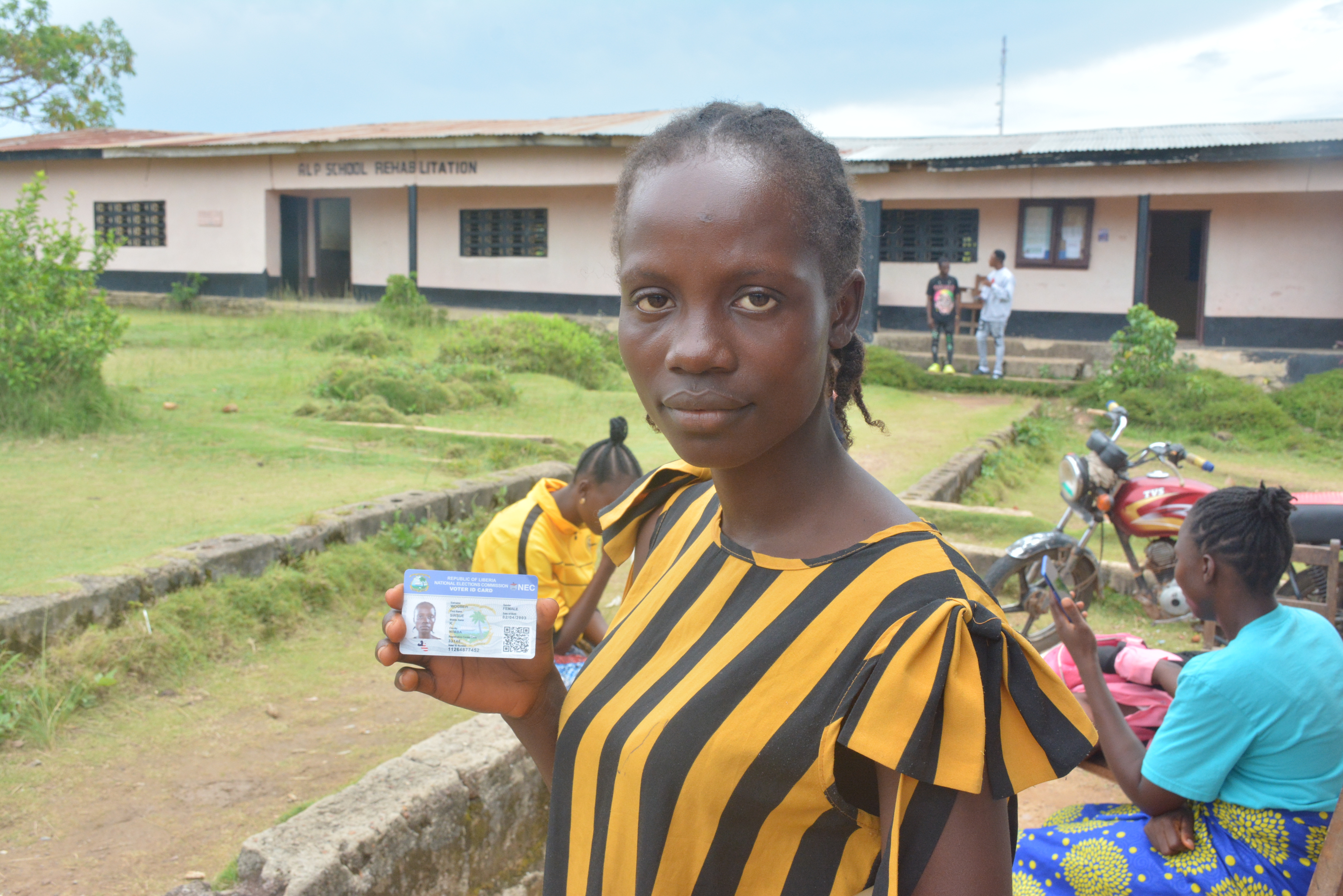Empowering Liberia's Future: A Resilient Democracy Through Youth Engagement
September 15, 2023

A young woman registers in Nimba County to participate in Liberia's Elections 2023
By James Monibah UNDP Liberia Pillar Head for Inclusive Governance, and Lisa Karlsson Rule of Law Officer
The world is united in celebrating International Day of Democracy, with this year's theme focusing on "Empowering the Next Generation." The question is how does democracy empower the "next generation", and what kind of legacy are they inheriting?
Liberia, a nation where a significant 60% of its population comprises individuals under the age of 25, stands at a pivotal crossroads as it nears its elections on October 10, 2023. The youth of Liberia will play a pivotal role in these elections not only by exercising their civic rights, but more importantly ensuring peaceful and non-violent elections. It is therefore an opportune time to reflect on the fundamental principles of democracy and the youth's profound influence on shaping Liberia's democratic landscape and their future.
Empowering the next generation through democratic principles entails ensuring access to quality education and healthcare, adherence to the rule of law, fostering engagement in governance through a peaceful electoral process, electing accountable leadership, and offering training and employment prospects.
Empowering the Next Generation
The bedrock of a thriving democracy lies in strong values and institutions that are grounded by initiatives that foster youth engagement, and participation, and cultivate leadership skills. By investing in the youth today, we are, in essence, fortifying the democratic foundation for generations to come. Democracy is inherently linked with the younger generation, as it possesses the capacity to empower the next generation and shape them into informed and responsible citizens. This is very much aligned with the ‘all affected’ principle, according to which everyone affected by a decision should have the right to participate in its making. A principle that generates an obligation to grant future generations a ‘voice’ in democratic institutions.
However, a high level of vulnerable and informal employment is a challenge in Liberia. Among women and youths, it constitutes 80% of the total employment. This poses significant socio-economic challenges in the country. Liberia’s low human capital index, ranking among the world’s lowest at 171 out of 174 in 2020 severely hampers young people’s ability to secure decent employment opportunities.
As we address the heritage of unmet Sustainable Development Goals, it is paramount to examine the Government's measures to ensure that the next generation’s voices are heard and that they have a tangible opportunity to shape their own future. Ensuring equal rights and protection under the law for all citizens, regardless of their age, remains a pivotal facet of any functioning democracy.
Addressing the challenges faced by at-risk youth, such as juvenile justice reform and rehabilitation programs, underscores Liberia's commitment to fairness and equity within its legal system. Moreover, recognizing the interplay between youth, the rule of law, and democracy calls for investments in legal education, youth advocacy, and civic engagement.
Empowering Democracy through the Next Generation
The connection between the new generation and democracy is not unidirectional; it is a symbiotic relationship where the youth of Liberia have the potential to strengthen democratic development. Youth participation in decision-making processes transcends mere inclusivity and is a strategic move toward fortifying democracy. The fresh perspectives and innovative ideas that young individuals bring to the table can serve as catalysts for progress. Initiatives such as youth councils and mentorship programs that encourage youth involvement in governance instill a sense of ownership and responsibility for the democratic process.
The youth wings of political parties must be given the opportunity to influence positively the governance architecture of the political parties. Then it is probable that they will impact the national governance structure, thus empowering the next generation to strengthen and uphold democratic values and principles.
Democracy acts as the cornerstone upon which resilient societies are built, ensuring equitable access to education, employment, and justice. Liberia's next generation can safeguard these fundamental values if they are given the opportunity grounded in good governance.
The rule of law forms the bedrock of a well-functioning democracy, ensuring accountability, transparency, and the protection of citizens' rights. Upholding the rule of law, especially in cases involving youth, sends a resounding message about Liberia's unwavering dedication to a just and equitable society. Incorporating the voices of young people, alongside broader inclusion factors such as gender and people living with disabilities in post-election governance is essential for the long-term vitality of Liberia's democracy.
As we celebrate International Day of Democracy, let us recommit ourselves to the empowerment of Liberia's youth, the pursuit of justice, and the unwavering adherence to the rule of law, all of which serve as the cornerstones of our democratic aspirations.
By investing in the potential of our youth and addressing the needs of those at risk, we are laying the foundation for a vibrant, inclusive, and enduring democracy. Together, we are shaping a future where the torch of democracy burns even brighter in the hands of Liberia's next generation.
On October 10, 2023, during the elections, let us remember that democracy is not just about casting votes but also about nurturing the democratic spirit within the hearts and minds of our youth, who hold the key to Liberia's prosperous and resilient democratic future.

 Locations
Locations